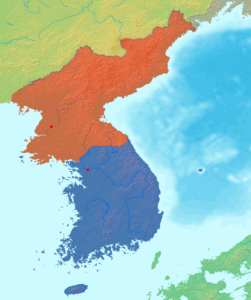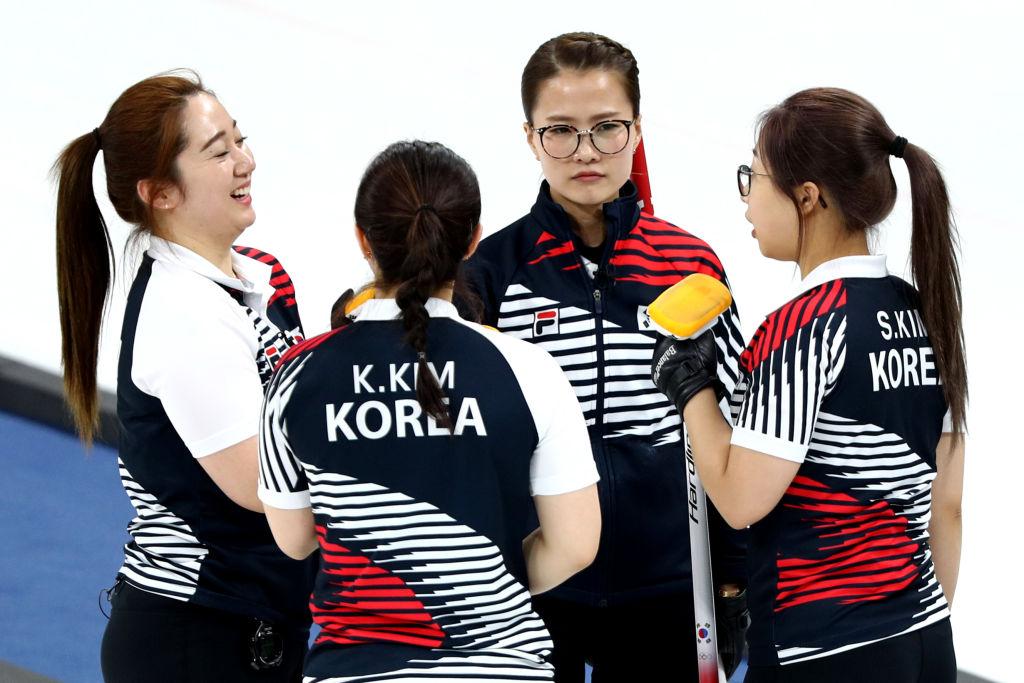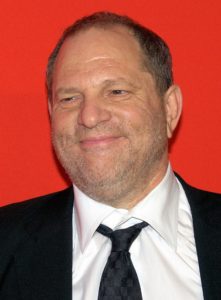On Friday, February 10, Kim Jong-un’s younger sister, Kim Yo Jong, stood with South Korea’s President Moon Jae-in on the center stage of the PyeongChang Olympics. It was here that she officially extended her brother’s invitation to the President of South Korea to travel north to meet with her brother. This visit was the first time any member of the ruling Kim family had visited the South. The moment has garnered a lot of media attention, and the gesture swept the front pages of many publications across the world.
In 1945, the Korean peninsula was split in half – a line was drawn horizontally across the middle, dividing Korea into what we now know as North and South Korea. North and South Korea had previously been one country, but post World War II shattered its integrity and eventually the Cold War led to the outbreak of war on the Korean peninsula. Specifically, in the power struggle for what ideological group would govern the Korean Peninsula, the USSR and China sided with the communist North whereas the United States supported the South. Tensions erupted when the North invaded the South. The Korean War lasted from June 1950 to July 1953. According to CNN News, 2,223,000 Koreans died in total, including military and civilian fatalities in both the North and South. Soldiers and civilians from other nations also lost their lives. About 54,260 Americans ended up dying, according to CBS News. In total, the U.S. spent about $67 billion on the war, with 90 percent of their aid sent to the South. The lives of the people on the peninsula were tossed to fate decide by which side of the line they lived on. An armistice finally ended the fighting in July The armistice was reached through talks that lasted over two years. Although the fighting ceased, there was no treaty, no conclusion, no termination of tensions – the Koreas are still in the middle of the conflict that has been ongoing for the last 73 years.

photo courtesy of Wikimedia Commons
The Olympics have exacerbated Korean tensions before. Since 1964, both North and South Korea have sent teams to many of the Olympic Games, both Summer and Winter. Seoul, South Korea campaigned to host the 1988 Summer Olympic Games. South Korea had to been demolished in the Korean War and had to be rebuilt, so the South Korean government saw the Olympics as an opportunity to prove its modernity and capability to the world. When the North heard that the games were to be held in Seoul, they were furious. They felt as though they had been betrayed and the South honored. The North Koreans attempted to participate through their initiative “One Korea will co-host.” The South pushed away this idea, asserting it would be too difficult to host the Games between two cities. South Korea then posed a compromise, offering the North five sporting events to host. The North refused the proposal.
Before and during the 1988 Games, fear grew about North Korea’s response to South Korea as site for the Games. The North was isolated from the rest of the world and acted unpredictably. The United States, in particular, expressed fear that the North would use violence to ruin the games. They were worried, along with many other countries, for the safety of the participating athletes who would go to Seoul. A year before the games, North Korea blew up a Korean National Airlines flight from Baghdad to Seoul — believing they could disrupt the games by threatening access to South Korea. The games, however, went forward without a hitch. As a precaution, at the 2018 South Korean Winter Olympics, the stadium areas in PyeongChang are dotted with underground evacuation centers. Although these locations are a secret, they symbolize the fear that many South Koreans feel about being located so close (within 50 miles) to North Korea.
That being said, South Koreans’ comfort has increased since the new year, when the North announced that it would accept the South’s invitation to participate in the PyeongChang Games.
Throughout the Winter Games, the two Koreas have stood together under one Korean flag, and competed in peace. North Korean president Kim Jong-un’s New Year’s participation announcement took the edge off of the recent tensions over North Korea’s growing nuclear capability. James Hoare, once the UK representative to PyeongChang, observed in The Guardian, “North Korea is trying to break out of the increasing international hostility they face, the isolation and the sanctions. The Olympics is a chance to present a different face to the world.” The cooperation of the North with the South seems a hopeful sign for an increase of peaceful conversations and a stronger relationship of the political entities on the peninsula.
Although a hopeful catalyst for peace, North Korea’s announcement of participation in the Games does not ease or erase the tensions between the two Korean states. Hoare notes of the North Korean initiative, “There’s also an element where they want to try to drive a wedge between the Americans and the South Koreans, and they saw an opportunity to accomplish that with [South Korean president] Moon Jae-in.” North Korea is purposefully trying to alienate the United States from Seoul.
Many people in the United States remain fearful of what the North and South’s collaboration might do to U.S. and South Korean partnership. Before the start of the Winter Games, U.S. Vice President Mike Pence expressed concern and attempted to warn people against the North’s apparent charm. “We will not allow North Korean propaganda to hijack the message and imagery of the Olympic Games,” Pence said in an article on CNN. “We’ll be there to cheer our athletes, but we’ll also be there to stand with our allies and remind the world that North Korea is the most tyrannical and oppressive regime on the planet.”
South Korea has accommodated many of the wishes of the North in an effort to defuse danger, as people have been leery of traveling to the Olympics. The North uses the intimidation card as a bargaining chip in negotiations around the Olympics. David Maxwell, a professor at Georgetown University, told CNN, “It’s pretty brilliant, and if it wasn’t Kim Jong Un and North Korea you’d have to admire what they’re doing, it’s pretty amazing. The North is masterful at getting something for nothing. They’re going to get recognition, legitimacy, resources, without giving anything up.”
Although there is a lot of hope for the peaceful conclusion to the games, the South remains on high alert. “They’re worried about an act of terrorism. They’re worried about a drone. They’re preparing. They’re looking for something to happen,” Joseph Siracusa, a professor at the RMIT University in Melbourne, Australia, told CNN. The South activated over 60,000 policemen, military and other security forces.
South Korean President Moon Jae-in’s presidential campaign was based on wanting to be the leader “who built a peaceful relationship” between the North and South. In an effort to unite, the South agreed to have all Korean athletes march under one flag, as opposed to the regular division. The South has also paused joint military exercises with the United States for the remainder of the Games.
The PyeongChang Games have been dubbed the “Peace Games” as the South has accomplished their initial goal of unity through the hosting of the 2018 Winter Games. That being said, South Korea still has a lot of work to do in terms of improving their overall relationship with their northern counterparts.







